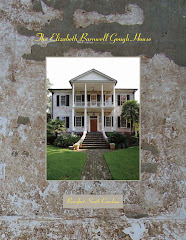
During the Revolution Elizabeth’s three brothers John, Robert and Edward all served as officers. In a war where many withdrew or changed sides under pressure, all three brothers served steadfastlly on the patriot side. By the war’s end, John had reached the rank of Brigadier General; Robert had been promoted to Colonel and Edward, a lieutenant at only 18, had reached the rank of Lt. Colonel.
February 9th 1779, Robert and Edward fought in brother John’s troop in a battle on Port Royal Island, remembered now for the two British officers who were killed and buried in St. Helena’s churchyard at John’s direction, reportedly saying:
“We have shown the British we not only can best them in battle but that we can also give them a Christian burial.”sup>6
Robert was wounded 17 times in one battle and left for dead.
For more than a year, all three brothers were held on the British prison ship Pack Horse in Charleston Harbor. In 1781, when the ship left to transport its prisoners to Philadelphia, the brothers helped to commandeer the ship and guide it into patriot hands.
After the war, John and Robert served in numerous important political positions. John was elected to the SC Senate in 1782 and with the exception of 1788-1791 was a senator until his death in 1800. He was promoted to Major General of the 2nd Militia in 1799. Robert and John were both part of South Carolina’s delegation to ratify the Constitution. Robert was a US congressman and declined to stand for a virtually assured election as a US senator. He served on Beaufort’s first City Council and was Beaufort’s first intendant (mayor). Both were active in the founding of Beaufort College and served as vestrymen of St. Helena’s Church. During their lives, John or Robert served in (or was offered) every public position of power or influence in Beaufort.
Their power was further enhanced by their early involvement with the growing of sea island cotton. Before the war, indigo had been the staple crop of the area, but with the post-war loss of a British subsidy it proved no longer a profitable crop. Brothers John, Robert and Edward were among the first to recognize the potential of sea island cotton and so were among the first to reap its rewards.
The tremendous impact of cotton on the post-war economy and the fortunes of the Barnwell brothers is evident in a comparison of export figures over a single decade. Between the fall of 1789 and 1790, South Carolina exported 9,840 pounds of the long staple crop. Between the fall of 1800 and 1801, the amount had risen to 8,301,907 pounds.7 The Revolutionary War had made them heroes. Cotton made their names synonymous with wealth, power and influence. If Tuscarora Jack can be said to have laid the foundation of Beaufort, then John, Robert and Edward were responsible for its cornerstone.
6The Story of an American Family, page 33
7The History of Beaufort County, South Carolina, page 281
Please note that the material in this blog is copyrighted. It is not to be reproduced without my specific written permission.
.jpg)
